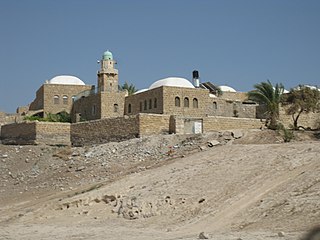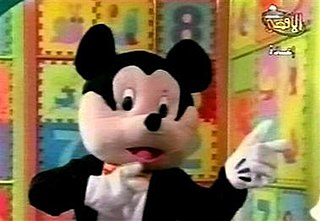 W
WThe Culture of Palestine is the culture of the Palestinian people, who are located in the Palestine, and across the region historically known as Palestine, as well as in the Palestinian diaspora. Palestinian culture is influenced by the many diverse cultures and religions which have existed in historical Palestine, from the early Canaanite period onward. Cultural contributions to the fields of art, literature, music, costume and cuisine express the Palestinian identity despite the geographical separation between the Palestinians from the Palestinian territories, Palestinian citizens of Israel and Palestinians in the diaspora.
 W
WKarimeh Abbud, was a Palestinian professional photographer and artist who lived and worked in Palestine in the first half of the twentieth century. She was one of the first woman photographers in the Arab World.
 W
WAl Midan Theater is the Arabic-speaking theater in Haifa, Israel.
 W
WPalestinian art is a term used to refer to paintings, posters, installation art and other visual media produced by Palestinian artists.
 W
WAl-Budeiri Library (Arabic: مكتبة العائلة البديرية Maktabat al-'A'ilat al-Budairiyya) is a small private library and archive located in the Old City of Jerusalem. Its collection includes approximately 900 manuscripts, dating from as early as the 12th century C.E. The library began as the personal collection of the Jerusalemite sharif, Sheikh Mohammad Ibn Budeir Ibn Mohammad Ibn Mahmud Ibn Hubaysh, also known as Ibn al-Hubaysh or Sheikh Budeir (1747-1805). Today, like many of Jerusalem's old family libraries, al-Budeiri seeks to increase scholarly access and awareness of its valuable collection of historical documents through partnerships with international cultural heritage organizations.
 W
WHandala, also Handhala, Hanzala or Hanthala, is a prominent national symbol and personification of the Palestinian people.
 W
WKhalidi Library (Arabic: المكتبة الخالدية al-Maktaba al-Khalidiyya) is a library and archive located in the Old City of Jerusalem. It was established in 1900, under Ottoman rule.
 W
WKhalil Sakakini Cultural Center is a leading Palestinian arts and culture organization that aims to create a pluralistic, critical liberating culture through research, query, and participation, and that provides an open space for the community to produce vibrant and liberating cultural content. Located in Ramallah, KSCC is housed in a renovated building, dating back to the early 20th century, based on traditional Palestinian architecture. Initially established in May 1996 as a branch of the Palestinian Ministry of Culture, KSCC was registered as a non-profit non-governmental organization (NGO) in 1998. The center is named after the Jerusalemite scholar, poet, and nationalist, Khalil Sakakini.
 W
WPottery and ceramics have been produced in the Levant since prehistoric times.
 W
WNabi Musa is the name of a site in the West Bank believed to be the tomb of Musa (Moses). It is also the name of a seven-day long religious festival that was celebrated annually by Palestinian Muslims, beginning on the Friday before Good Friday in the Orthodox calendar used by the Greek Orthodox Church of Jerusalem. Considered in the political context of 1920 as "the most important Muslim pilgrimage in Palestine", the festival centered on a collective pilgrimage from Jerusalem to what was understood to be the Tomb of Moses, near Jericho. A great building with multiple domes marks the mausoleum of Moses.
 W
WOlive trees are a major agricultural crop in the Palestinian territories, where they are mostly grown for olive oil production. It has been estimated that olive production accounted for 57% of cultivated land in the Palestinian territories with 7.8 million fruit-bearing olive trees in 2011. In 2014, an estimated 108,000 tonnes of olives were pressed producing 24,700 tonnes of olive oil – which contributed US $10.9 million in added value to the crop. Around 100,000 households rely on olives for their primary income.
 W
WThe Palestinian Heritage Center is a Palestinian cultural center located in Bethlehem. It was established in 1991 by Maha Saca. The center contains several exhibitions on Palestinian costumes, folklore, history, and other cultural aspects.
 W
WPalestinian stone-throwing refers to a Palestinian practice of throwing stones at people or property. It is a tactic with both a symbolic and military dimension when used against heavily armed troops. Proponents, sympathizers, as well as analysts have characterized stone throwing by Palestinians as a form of "limited", "restrained", "non-lethal" violence. The majority of Palestinian youths engaged in the practice appear to regard it as symbolic and non-violent, given the disparity in power and equipment between the Israeli forces and the Palestinian stone-throwers, with many considering it a method of deterring Israeli military forces and civilians from the occupation of Palestinian lands. The state of Israel considers the act to be criminal, on the grounds that it is potentially lethal. In some cases, Israelis have argued that it should be treated as a form of terrorism, or that, in terms of the psychology of those who hurl stones, even in defense or in protest, it is intrinsically aggressive.
 W
WSpeak, Bird, Speak Again: A book of Palestinian folk tales is a book first published in English in 1989 by Palestinian authors Ibrahim Muhawi and professor of sociology and anthropology at Bir Zeit University Sharif Kanaana.
 W
WTomorrow's Pioneers, also known as The Pioneers of Tomorrow, is a Palestinian children's television show. The series was broadcast by the Hamas-affiliated television station Al-Aqsa TV from April 13, 2007 to October 16, 2009, and featured young host Saraa Barhoum and her co-host, a large costumed animal as they perform skits and discuss life in Palestine in a talk show fashion with call-ins from children. Presented in a children's educational format similar to such other preschool shows as Sesame Street or Barney & Friends, Tomorrow's Pioneers is highly controversial as it contains antisemitism, Islamism, anti-Americanism, and other anti-Western themes.
 W
W W
W W
W